
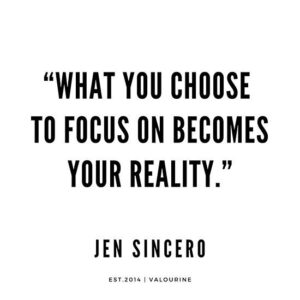
Lately, I have noticed there seems to be a lot of angst in the world. I feel this unrest may have something to do with presence. It is almost like people worry ahead of time as if this will prevent future circumstances from occurring. Directing our mind to the present moment is not an easy task. It is much more automatic to daydream about things that have yet to happen. However, this robs us of appreciating life as it is right now and creates a lot of unnecessary suffering.
I used to worry about things until my stomach hurt. Big things like the sun exploding, someone breaking into the house, or my Mom dying. All this unnecessary suffering eventually resulted in a stomach ulcer when I was in the fourth grade. It is incredible how many of us focus on the worst-case scenario on a daily basis. My mind still does this. Luckily, I now have more tools to refocus my mind when it loses sight of the present moment.
Time To Learn How to Refocus:
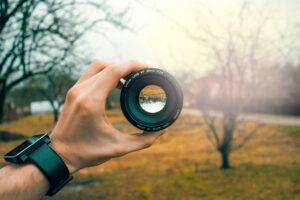
Distraction appears to be a more popular, widespread, societal practice than focus is. Distraction prevents someone from fully attending to something else. Because we get so good at practicing distraction, we start to allow our minds to jump from thought to thought and thing to thing. Some forms of distraction include social media, smartphones, video games, substances, food, shopping, or engaging in anything as a way to feel better temporarily.
I believe success is not solely due to intelligence, but rather is found in how focused someone is. The problem with focus is that no one ever taught us how to do it, which is puzzling, considering we MUST focus if we ever wish to accomplish anything or learn something new.
A majority of the kids I work with have a diagnosis of Attention Deficit Hyperactivity Disorder (ADHD). One of the first things I teach them is the importance of focus. “If we want to learn anything, we must first know how to focus,” is a familiar spiel I give them. When their attention wanders, I redirect them by having them refocus their eyes to me. Then I know they are paying attention to my words rather than to their fast-paced and distracting thoughts.
Drishti
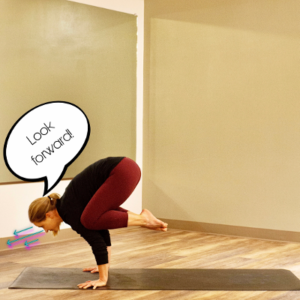
In the Yoga tradition, the term for a focused eye gaze is Drishti. It is a useful tool used in Yoga to help improve focus and balance. The use of Drishti enables the practitioner to stay balanced and centered while in a yoga pose. For example, it is essential to look forward as opposed to down when in a balancing pose. If you look down, you go down. Instead, keep your eyes focused on where you want to go.
Drishti is also a tool used to help minimize distractions by keeping the eyes focused on one spot. In Ashtanga, a specific style of Yoga, there are nine possible Drishti’s, or focal points to direct the eyes. Each pose is assigned one of these particular focal points. Distractions become less prevalent when you bring your gaze to one single point rather than fixate on the countless stimuli surrounding you.
How to Improve Focus:
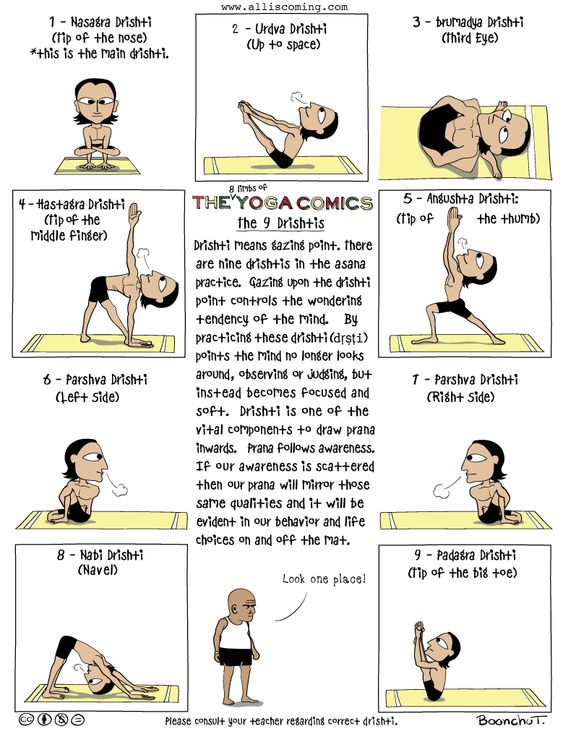
You can use Drishti when you find yourself not on your yoga mat to develop your focus muscle. Concentration is your ability to keep your attention on one thing for an extended period. Like a muscle, you can train the skill of focus to become stronger the more you practice it. Every time your mind drifts off, use the quality of willpower to bring your attention and Drishti right back to the object of focus. You can work on this during any pursuit, such as having a conversation, driving, writing, cooking, or skiing down a mountain.

Another tool I use to help me focus on the present moment is the breath. I find counting to be therapeutic. When coupled with the breath, reciting numbers becomes incredibly centering. I often count to five or six on inhalation and the same amount of time on an exhalation. I try to keep my mind focused on the count and the movement of my breath. Then I work on bringing my mind back when it wanders to something else. Building focus takes time. But like anything, the more we practice, the easier it becomes.
Pick Your Focus Wisely:
Another culprit that robs us of the present moment is what we choose to focus on. What we choose to pay attention to will determine how we experience and interpret the world. It may be necessary to question the stimuli we deem relevant or essential because what we chose to focus on influences our quality of life.
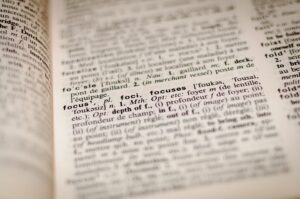
My Grandpa was an extraordinary man. Unfortunately, he fell victim to directing his focus to the media’s endless stream of information during his final years of life. There is nothing wrong with staying informed. But my Grandpa’s news station appeared to high jack his brain to focus on fear. He began to question the state of the world after being fed threatening and discouraging information. The media told him all that was wrong, so his brain began to look for evidence within his environment to support these statements. He slowly became more paranoid and the positive aspects of life casually erased as he made room for potentially looming scenarios.
My Grandpa lived a remarkable life. He was an intelligent, loving, humorous, miraculous man and one of my most favorite people of all time. But I saw how the news had such a profoundly negative effect on how he perceived his final years of life.
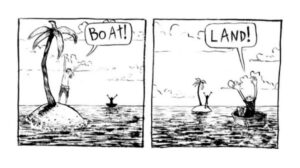
No one perception is better than another. There are just those that are helpful and those that are not. I choose not to focus too much on the news because I don’t find it beneficial to view the world from this lens. From experience, I have learned that this kind of input causes my brain to ruminate on all that could go wrong. If I chose fear to be the center of my focus in other areas of my life, I would never get out of the car to backcountry ski. Moving to Alaska would have been out of the question. I am pretty sure I also wouldn’t be typing these words right now. While it may be helpful to be aware of potential threats, having them be at the forefront of our attention can prevent us from fully living and experiencing life-and a joyful one at that.
How to Consciously Select What to Focus On:

Take the time to pay attention to your mind. It is the most powerful thing humans have control over. The only thing I can control is how my mind reacts to circumstances. For example, after watching the news, I can choose to think the world is a gigantic mess. This thought makes me feel hopeless. When I feel hopeless, I am more likely to crawl up on the couch and search for further evidence to support that the world is a hot mess.
I could also watch the news and choose to think that while bad things are happening in the world, the only thing I can control is myself. This thought makes me feel empowered. When I feel empowered, I am more likely to look for ways to affect those around me positively. And I am more likely to smile at the check out lady at the grocery store when I am thinking this thought than if I were to think the world might end.
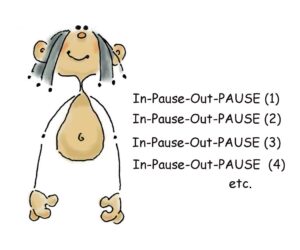
Another useful tool is to give something “equal playtime.” If you consume something that creates negative feelings, then also engage in the opposite for an equal amount of time to balance these feelings out. So, if you spend 15 minutes anticipating the worst-case scenario, give yourself 15 minutes to imagine the best-case scenario. We want to give equal time to other possibilities and potential outcomes rather than only those that pose threats. Then bring your mind right back to counting your breath.
Resetting Our Focus:
There was a period I stopped practicing Yoga. I didn’t touch any mat, book, or practice that had to do with Yoga. I took a break shortly after graduating from Grad School and moving to a new location without a studio nearby. I went through a rough patch, and I knew I needed a change. So I went to Nicaragua for a month to reimmerse myself in the practice. I forgot just how much I loved Yoga and how it was also something positive for my mind to focus on.

We all tend to lose touch with the things we loved. Something about being an adult can distract us from engaging with these things regularly. So what things do you focus on that brings you joy? If you aren’t sure what these things are, then question what brought you happiness as a kid. Most importantly, what are those things that feel “life-giving” rather than “life-draining?” Interacting with what we love naturally creates presence since there isn’t anything else we would rather be doing.
Focus on You:
I hope you count your breath more, pick useful thoughts, and absorb yourself in the things that bring you joy.I know the world is not all rainbows and butterflies. There is no doubt we are going through some strange and challenging times. But I sincerely feel if we all just choose to focus on being a little better each day, our world would be in better shape. We can all focus on being a little more present, loving, and helpful. In the end, it is all going work out just fine.








Great thinking and writing Kris!!
Thank you and be safe always.
Thank you so much Dave!